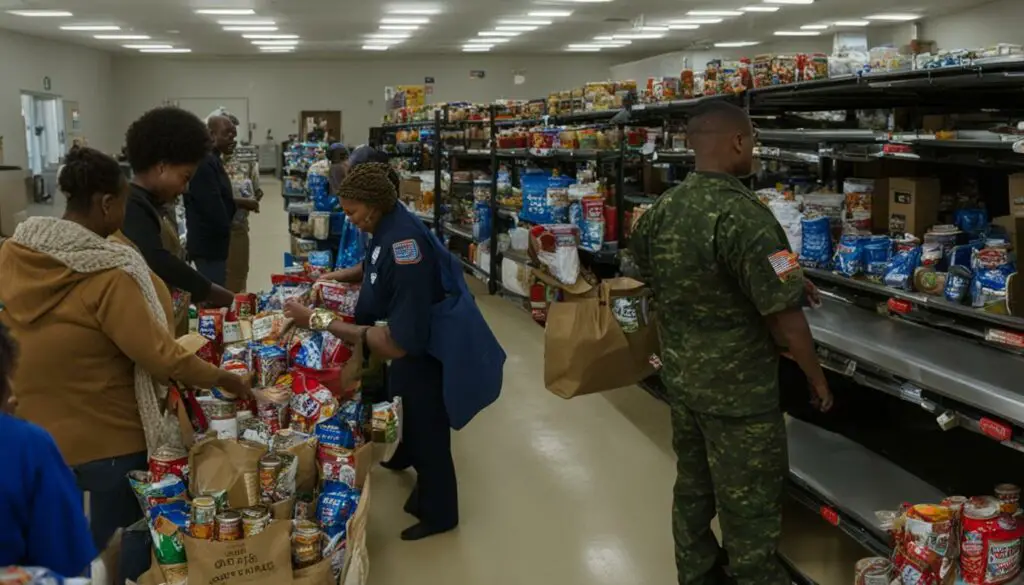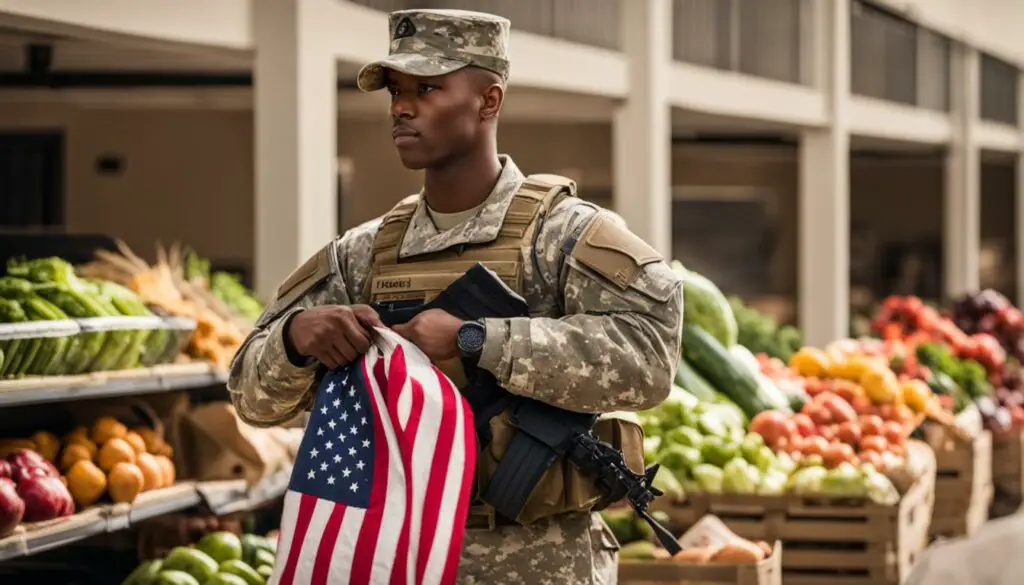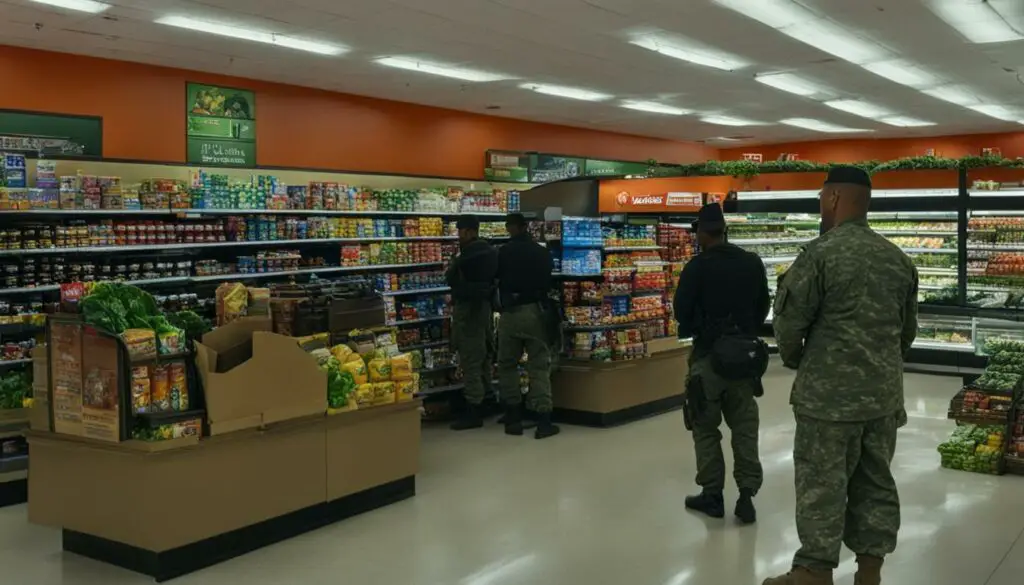Originally posted on December 14, 2023 @ 8:52 pm
Food stamps, also known as the Supplemental Nutrition Assistance Program (SNAP), and the Special Supplemental Nutrition Program for Women, Infants, and Children (WIC), are food assistance programs that can help low-income military members and their families buy food.
In the United States, military families stationed can apply for food stamps at their local SNAP office, with certain income requirements that must be met. Combat pay, hostile fire pay, and imminent danger pay are not counted as income for SNAP eligibility, but all other pay, including Basic Allowance for Housing (BAH), is. Additionally, military families can also apply for the WIC program, which provides vouchers for healthy food.
There are also free and reduced lunch programs available for military children, as well as the Basic Needs Allowance (BNA) to help raise a military member’s household income to 130% of the federal poverty level.
Table of Contents
Key Takeaways:
- Food stamps and the WIC program are available to help low-income military members and their families buy food.
- Certain income requirements must be met to be eligible for food stamps, with combat pay and certain allowances not counted as income.
- The WIC program provides vouchers for healthy food to low-income military families with pregnant moms or children up to the age of five.
- Military children may also qualify for free and reduced lunch programs both on-base and off-base.
- The Basic Needs Allowance (BNA) aims to bring a military member’s household income up to 130% of the federal poverty guidelines.
Food Stamps and Military Families
Military families stationed in the U.S. have the option to apply for food stamps through the SNAP program. Each state administers the program, but the United States Department of Agriculture (USDA) can help individuals find their nearest office. Eligibility for food stamps is based on income requirements, and while combat pay and certain allowances are not counted towards income, other pay such as Basic Allowance for Housing (BAH) is. This means that eligibility for food stamps may vary depending on the cost of living in different areas. Advocates are pushing for legislation to include BAH as income that is not counted for SNAP purposes. The number of military families utilizing SNAP benefits is difficult to track, but in 2019, approximately 22,000 active-duty troops used food stamps.
| Year | Number of Active-Duty Troops Using Food Stamps |
|---|---|
| 2019 | 22,000 |
Special Supplemental Nutrition Program for Women, Infants, and Children (WIC)

Military families who are in need of food assistance can also apply for the Special Supplemental Nutrition Program for Women, Infants, and Children (WIC). This program is designed to provide vouchers for healthy food to low-income families with pregnant mothers or children up to the age of five.
WIC covers a variety of nutritious food items, including produce, milk, bread, eggs, beans, formula, baby food, fresh fruits and vegetables, cheese, juice, cereal, and peanut butter. These vouchers can be used at authorized retailers to ensure that military families have access to essential nutritional resources.
One of the advantages of the WIC program is that it does not factor in Basic Allowance for Housing (BAH) payments when determining eligibility. This makes WIC more accessible to military families who may rely on BAH as a significant portion of their income.
It is important to note that a version of the WIC program is also available to military families stationed overseas. This ensures that military members and their families, regardless of their location, can access the support they need to maintain a healthy diet for both themselves and their young children.
Your Guide to WIC-Eligible Food Items
| Food Category | WIC-Eligible Items |
|---|---|
| Produce | Fresh fruits and vegetables |
| Dairy | Milk, cheese, and yogurt |
| Grains | Bread, tortillas, pasta, and rice |
| Protein | Eggs, peanut butter, canned tuna, and beans |
| Infant-Friendly | Baby food, formula, and cereal |
| Beverages | Juice and water |
“The WIC program not only provides financial support for nutritious food, but it also offers education and guidance on healthy eating habits for women, infants, and young children. By helping military families access these essential resources, we are ensuring the overall well-being and development of our military community.” – Dr. Jane Thompson, Nutrition Specialist
Free and Reduced Lunch Programs

Military children have the opportunity to benefit from free and reduced lunch programs, both on-base and off-base. These programs, managed by the USDA, take into account Basic Allowance for Housing (BAH) when determining eligibility for families residing off-base. However, families who receive SNAP or Temporary Assistance for Needy Families (TANF) benefits are automatically eligible for the free and reduced lunch program.
In 2019, approximately 24% of children attending U.S. Department of Defense Education Activity (DoDEA) schools were eligible for free meals, while 21% qualified for reduced-price meals.
Through these lunch programs, military children have access to nutritious meals that support their well-being and academic success. It is important for military families to take advantage of these programs and ensure their children have a well-balanced diet throughout their school years.
Basic Needs Allowance (BNA)

The Basic Needs Allowance (BNA) is a monthly allotment designed to provide additional assistance to military families in need. It aims to bring a service member’s gross household income up to 130% of the federal poverty guidelines, taking into account factors such as location, family size, other household income, and paycheck allotments.
The BNA is an important resource for military families who may be eligible for food stamps. By increasing their household income, the BNA helps to bridge the gap and provide essential support for accessing nutritious food.
| Benefits of Basic Needs Allowance | Eligibility Criteria | |
|---|---|---|
| 1. Additional financial support for military families. | 1. Location: Variable based on cost of living. | 2. Family size: Consideration of dependents. |
| 2. Helps to meet the increased expenses of daily living. | 3. Other household income: Including spouse’s income. | 4. Paycheck allotments: Determining net income. |
| 3. Uplifts household income to 130% of federal poverty guidelines. | 5. Basic Allowance for Housing (BAH): Excluding if living on base. | |
The Basic Needs Allowance is scheduled to start on January 1, 2023. This program holds significant promise for military families seeking support and assistance in accessing food stamps and overcoming financial challenges.
Family Subsistence Supplemental Allowance (FSSA)

The Family Subsistence Supplemental Allowance (FSSA) program was created in 2001 to provide federal food benefits to service families. Eligibility for FSSA was based on household income and size, with different rates for different duty stations.
However, the FSSA program was terminated for families stationed in the U.S. in September 2016 based on recommendations from the Military Compensation and Retirement Modernization Commission (MCRMC). Studies found that the Supplemental Nutrition Assistance Program (SNAP) benefits were a more efficient way to assist needy families. As of now, fewer than 300 people worldwide qualify for FSSA.
Comparison of FSSA and Basic Needs Allowance (BNA)
| FSSA | BNA |
|---|---|
| Income-based eligibility | Income-based eligibility |
| Different rates based on duty stations | Adjusted for location, family size, and household income |
| Terminated in September 2016 | Scheduled to start on January 1, 2023 |
| Limited number of beneficiaries | Intended to provide additional assistance to military families in need |
The Basic Needs Allowance (BNA) has been designed to replace the FSSA program. The BNA aims to bring a service member’s gross household income up to 130% of the federal poverty guidelines. It takes into account factors such as location, family size, other household income, and paycheck allotments, excluding Basic Allowance for Housing (BAH) if the family lives on base.
Supplemental Nutrition Assistance Program (SNAP)

The Supplemental Nutrition Assistance Program (SNAP), formerly known as food stamps, is a government program that provides food assistance to individuals and families with low household income and limited resources. SNAP benefits are distributed through the Lone Star Card, which functions like a credit card and can be used at authorized retailers.
Eligibility for SNAP benefits varies by state, with each state setting income limits based on family size. For example, in Texas, households must meet certain income requirements to qualify for SNAP benefits. Most adults between the ages of 18 and 49 without children in their home can receive SNAP benefits for three months within a three-year period, unless they meet specific work requirements.
SNAP benefits are available to a wide range of individuals, including families, seniors, people with disabilities, and veterans or active military members. The application process for SNAP involves providing information about income, assets, and expenses to determine eligibility.
Eligibility for SNAP Benefits by State
| State | Income Limits | Family Size |
|---|---|---|
| Texas | $X,XXX – $X,XXX | X |
Note: The table represents hypothetical income limits for illustrative purposes only.
SNAP benefits play a crucial role in providing essential nutrition to individuals and families in need. By ensuring access to healthy food options, SNAP helps promote better overall well-being and supports households in achieving food security.
Image: An image highlighting the eligibility for food stamps in the military.
Snap Work Requirement
Eligibility for SNAP benefits in the military is subject to work requirements in some states, including Texas. In Texas, SNAP recipients between the ages of 16 and 59 are required to meet certain work criteria to receive benefits.
To meet the work requirement, individuals must either:
- Work at least 30 hours per week
- Participate in SNAP Employment and Training programs through the Texas Workforce Commission
While work requirements exist, there are exemptions available for certain individuals. These exemptions include:
- Being physically or mentally unfit to work
- Caring for a child under six or someone with a disability
- Being a student enrolled in school or a work training program
- Already being registered for employment services under TANF
- Being pregnant
Please note that eligibility for work requirements and exemptions may vary by state, so it’s important to check the specific regulations in your state of residence.
| Work Requirement | Exemptions |
|---|---|
| Work at least 30 hours per week | Being physically or mentally unfit to work |
| Participate in SNAP Employment and Training programs | Caring for a child under six or someone with a disability |
| Being a student enrolled in school or work training program | |
| Already registered for employment services under TANF | |
| Being pregnant |
Applying for SNAP Benefits

Applying for SNAP benefits is a straightforward process that can help military members and their families access the support they need. To begin the application process, individuals can use the online screening tool on the Your Texas Benefits website or reach out to the Health and Human Services Commission (HHSC) by phone. The application will require accurate information about income, assets, and expenses, so it’s important to gather these details beforehand.
Once the application is submitted, there may be a phone interview conducted by the HHSC before approval. This interview helps ensure that the information provided is accurate and complete. If an application is considered incomplete, applicants will receive written notice with a deadline to provide the missing information and complete the application process.
It’s worth noting that SNAP benefits typically require renewal every six months. This ensures that the program can continue to support eligible individuals and families in accessing nutritious food. Throughout the application and renewal process, applicants have the right to a written decision on their application and the option to appeal if needed.
Key Points:
- Start the application process by using the online screening tool on the Your Texas Benefits website or contacting the HHSC by phone.
- Provide accurate information about income, assets, and expenses during the application process.
- Be prepared for a potential phone interview conducted by the HHSC.
- Renew SNAP benefits every six months to maintain eligibility.
- Applicants have the right to a written decision on their application and the option to appeal if needed.
Other Food Assistance Programs
In addition to SNAP (Supplemental Nutrition Assistance Program), there are other food assistance programs available for low-income individuals and families. These programs can provide additional support and resources to those who qualify. Some of the other food assistance programs that military members and their families may be eligible for include:
Emergency SNAP
Emergency SNAP is a program that provides expedited food assistance within a day or two for individuals and families facing immediate food needs. It is designed to help those who are experiencing a crisis situation and require immediate assistance. Emergency SNAP can provide temporary relief while individuals work on obtaining long-term support through regular SNAP benefits.
Texas Simplified Application Project (TSAP)
The Texas Simplified Application Project (TSAP) is a program that aims to make the SNAP application process easier for eligible households. TSAP streamlines the application process and provides three years of benefits at a time for eligible individuals and families. This simplification helps to reduce the administrative burden and ensures that eligible households have access to food assistance for an extended period.
Food Pantries and Food Banks
Food pantries and food banks are community-based organizations that distribute food and groceries to individuals and families in need. They work to address immediate food needs and provide support to those facing food insecurity. Food pantries typically distribute non-perishable food items, while food banks collect and distribute large quantities of food to multiple organizations and agencies. These resources can be valuable for military members and their families who require additional food assistance.
It is important for military families in need to explore all available options for food assistance. These programs and resources can provide much-needed support and help ensure that military members and their families have access to nutritious food during challenging times. By utilizing these programs, military families can alleviate some financial stress and focus on other important aspects of their lives.
Rights and Appeals
When applying for SNAP benefits, it is important for military members and their families to understand their rights and options, as well as the appeals process in case their application is denied. Here are some key points to know:
Rights
Applicants have certain rights throughout the SNAP application process:
- Written Notice: If your application is considered incomplete, the agency must provide written notice informing you of the missing information.
- Written Decision: You have the right to receive a written decision on your application, explaining the agency’s determination.
- Continued Benefits: While waiting for a decision on your application or during the appeals process, your SNAP benefits will continue.
- Legal Representation: You have the right to have a legal representative assist you during the appeals process.
- Interpretation Assistance: If you have limited English proficiency, interpretation assistance is available at no cost to you.
Appeals
If your SNAP application is denied or if you disagree with a decision made by the agency, you have the right to appeal. The appeals process allows you to present your case and have it reviewed by an impartial hearing officer. Here are the steps to take:
- File a Request for an Appeal: You must submit a written request for an appeal to the appropriate agency within the specified timeframe.
- Prepare for the Hearing: Gather any relevant documents and evidence that support your case. You may also want to consider having a legal representative assist you.
- Attend the Hearing: The hearing will be scheduled, and you will have the opportunity to present your case and provide any additional evidence or testimony.
- Receive the Decision: After the hearing, you will receive a written decision on your appeal.
It is important to carefully follow the appeals process and meet all deadlines to ensure your case is properly considered. Remember, you have the right to present your side of the story and seek a fair resolution.
Conclusion
Military members and their families may be eligible for food assistance programs such as SNAP and WIC. To qualify for these programs, eligibility is based on income requirements, taking into account certain pay and allowances. It is important for military families in need to explore all available food assistance programs and resources to ensure they have access to nutritious food.
In addition to SNAP and WIC, military children can benefit from free and reduced lunch programs both on-base and off-base. These programs take into account the Basic Allowance for Housing (BAH) when determining eligibility. Furthermore, the Basic Needs Allowance (BNA) has been implemented to help raise a military household’s income to alleviate financial strain.
By taking advantage of these food assistance programs, military families can find support in accessing essential nutrition. Prioritizing the well-being of military members and their loved ones is crucial to maintaining a strong and resilient military community.
FAQ
Can military members get food stamps?
Military members and their families may be eligible for food stamps, also known as the Supplemental Nutrition Assistance Program (SNAP), based on certain income requirements.
Are there food assistance programs available for military families?
Yes, military families can apply for food stamps through the SNAP program and the Special Supplemental Nutrition Program for Women, Infants, and Children (WIC). There are also free and reduced lunch programs available for military children.
What is the Special Supplemental Nutrition Program for Women, Infants, and Children (WIC)?
WIC is a program that provides vouchers for healthy food to low-income families with pregnant moms or children up to age five. It covers items such as produce, milk, bread, eggs, beans, formula, baby food, fruits, vegetables, and more.
Are there free and reduced lunch programs available for military children?
Yes, both on-base and off-base free and reduced lunch programs are available for military children. Eligibility takes into account the Basic Allowance for Housing (BAH) for families who live off-base.
What is the Basic Needs Allowance (BNA)?
The BNA is a monthly allowance designed to bring a service member’s gross household income up to 130% of the federal poverty guidelines. It aims to provide additional assistance to military families in need.
What is the Family Subsistence Supplemental Allowance (FSSA)?
The FSSA program provided federal food benefits to service families based on household income and size. However, it was terminated for families stationed in the U.S. in 2016. The Basic Needs Allowance was designed to replace it.
What is the Supplemental Nutrition Assistance Program (SNAP)?
SNAP, formerly known as food stamps, is a government program that helps people with low household income and resources buy food. Eligibility varies by state, and benefits are distributed through the Lone Star Card in Texas.
Are there work requirements for SNAP benefits?
In Texas, for example, recipients between the ages of 16 and 59 must meet work requirements to receive benefits. There are exemptions to the work requirement based on certain circumstances.
How do I apply for SNAP benefits?
Individuals can use the online screening tool or contact the Health and Human Services Commission (HHSC) to apply for SNAP benefits. Accurate information about income, assets, and expenses is important during the application process.
Are there other food assistance programs available?
Yes, apart from SNAP, there are other programs such as emergency SNAP and the Texas Simplified Application Project (TSAP) that make the application process easier. Food pantries and food banks also provide assistance to those in need.
What are my rights and options if my SNAP application is denied?
Applicants have the right to a written decision and the option to appeal if their application is denied. Benefits will continue while awaiting a decision, and applicants can have a legal representative help with the appeal process.
Source Links
- https://www.feedingtexas.org/snap/
- https://www.military.com/paycheck-chronicles/2014/02/18/military-and-food-stamps
- https://texaslawhelp.org/article/food-stamps-snap
See also:
Leave a Reply